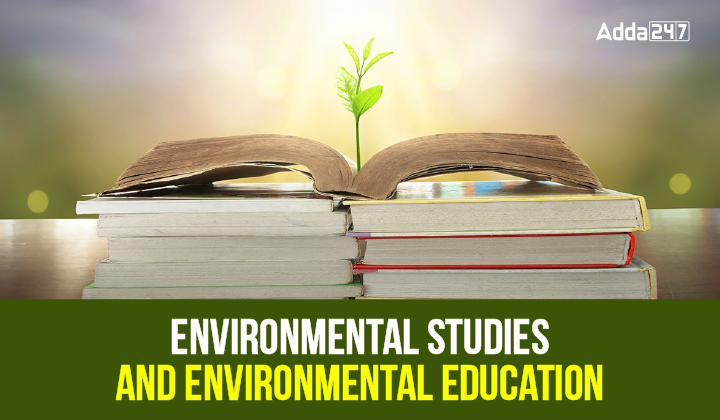Table of Contents
Environmental Studies is a comprehensive field that encompasses various branches of science, such as chemistry, physical science, life science, agriculture, health, and sanitary engineering. This intriguing subject plays a significant role in CTET and other State TET Exams, featuring 30 questions. The Environmental Science section in these exams is divided into two parts: Subject Content, accounting for 15 marks, and EVS Pedagogy, also worth 15 marks. To excel in the CTET Exam, it is recommended to study the NCERT books from classes 1 to 8 thoroughly. In this article, we will provide an introductory overview of EVS Pedagogy to aid your preparation.
Environmental Studies
Environmental Studies is a multidisciplinary academic field which systematically studies human interaction with the environment in the interests of solving complex problems. Environmental studies bring together the principles of sciences, commerce, economics and social sciences so as to solve contemporary environment, problems.
Aims and Objectives of Environmental:
• Studies (EVS) at Primary Level The general objectives of EVS at primary level are given below
• develop ideal citizenship in children and to give comprehensive knowledge of integrated curriculum of history, geography and civics.
• To develop understanding of the contemporary problems in children.
• training to children to change according to their social environment.
• introduce children to democratic norms and to give training to children for good thought and meditation.
• aware children about their social environment.
• develop the feeling of national and international integration and to give knowledge about their rights and duties.
• encourage children to be a conscious member of their family, town, village and country.
• develop the feeling of nationalism in children and to motivate children to be an ideal citizen and have a good character in life.
Environmental Education
• Environmental Education refers to organize efforts to teach how natural environments function and particularly, how human beings can manage behavior and ecosystems to live sustainably. It is a multi-disciplinary field integrating disciplines such as biology, chemistry, physics, ecology, Earth science, atmospheric science, mathematics and geography. The term often implies education within the school system from primary to post-secondary.
• Environmental education is a process aimed at developing a world population that is aware and concerned about the environment and its associated problems and which has the knowledge, attitudes, commitments and skills to work individually and collectively towards the solution of current problems and for prevention of new ones.
• According to Odem, “Environmental education is the education of biological and physical environment which surrounds human.
Environmental Studies through Environment:
When a child attracts towards the creatures of environment then to familiarize the inter-relationship between the two through environment is called ‘Environmental Education.’
Environmental Education in Environment:
• Man works for his existence and growth in environment. He lives in family. Family is the primary social group for men.
• When human advances from infancy to childhood he comes in contact with neighborhood and community. He participates in activities of his society. Thus, he acquires knowledge about the environment. According to John Dewey, “All education begins when man participates in social consciousness of his race.”
Environmental Awareness:
• Environmental awareness has direct bearing on the protection and conservation of the environment. As population will become aware of the environment, they will contribute more towards environment conservation.
• Media and non-governmental organisation plays very important role in spreading awareness about environment. Different institutions like Zoological Survey of India, Botanical Survey of India and Wildlife Institute of India play vital role in supporting the awareness programme.
• Through study of EVS at very young stages, these young minds will be aware about the environment, it needs and usefulness etc. and in a way they will protect and conserve the environment.
Need and Importance of Environmental Education:
Some of the importance of environmental education is discussed below:
• Environmental education strongly promotes the need for personal initiatives and social participation to achieve sustainability. Environmental education is important for understanding the basis of our existence and those around us. Hence, this stresses on the subject.
• Environmental education, together with sound legislation, sustainable management and responsible actions by individuals and communities, is an important component of an effective policy framework for protecting and managing the environment.
• Environmental education is a new focus for education. It is a way of helping individuals and societies to resolve fundamental issues relating to the current and future use of the world’s resources. However, simply raising awareness of these issues is insufficient to bring about change.
• Environmental education must strongly promote the need for personal initiatives and social participation to achieve sustainability.
• It focuses on current and potential environmental situations, while taking into account the historical perspective.
• It promotes the value and necessity of local, national and international cooperation in the prevention and solution of environmental problems.
• It relates environmental sensitivity, knowledge and problem-solving skills and values clarification to every age, but with special emphasis on environmental sensitivity to the learner’s own community in early years.
Objectives of Environmental Education:
The main objectives of environmental education are as follow:
• The common duty of maintaining, protecting and improving the quality of environment, as a contribution to the protection of human health and safeguarding the ecological balance.
• It provides the way in which each individual can, by his own behavior and action, contribute to the protection of environment.
• It provides opportunities to acquire the knowledge, values, attitudes, commitment and skills needed to protect and improve the environment.
• It encourages pupils to examine and interpret the environment from variety of perspectives physical, geographical, biological, sociological, economic, political, technological, historical, aesthetic and ethical.
• It helps to arouse pupil’s awareness and curiosity about the environment and encourage active participation in resolving environmental problems.
• It plays an important role to minimize population growth.
• It helps to develop national integrity among the students. It plays a significant role in the protection of wildlife and to operate forest laws judiciously.



 Odisha Teacher Short Notification 2026 O...
Odisha Teacher Short Notification 2026 O...
 RRB Railway Teacher Result 2025 Out for ...
RRB Railway Teacher Result 2025 Out for ...
 HTET Syllabus 2026 (PRT, TGT, PGT), Chec...
HTET Syllabus 2026 (PRT, TGT, PGT), Chec...












